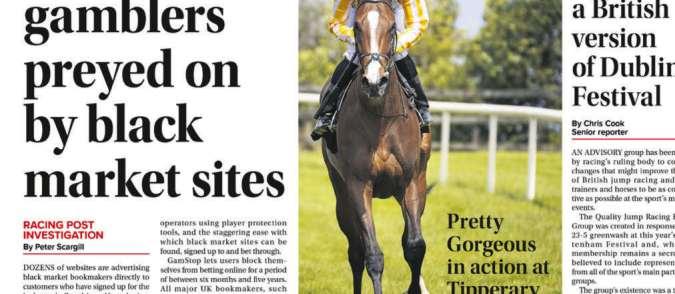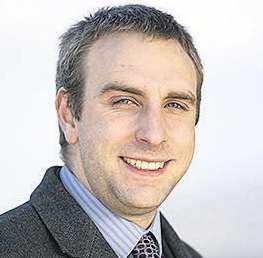
7 minute read
Reporter of the Year
from 2021 HWPA
by Weatherbys
T H E N O M I N A T I O N S John Oaksey Trophy REPORTER
of the Year
“An entry that offers an excellent investigative piece, backed up by a strong news exclusive”
BILL BARBER

“Had the exclusive of the year, supported by articles displaying flair and punch”
DAVID JENNINGS
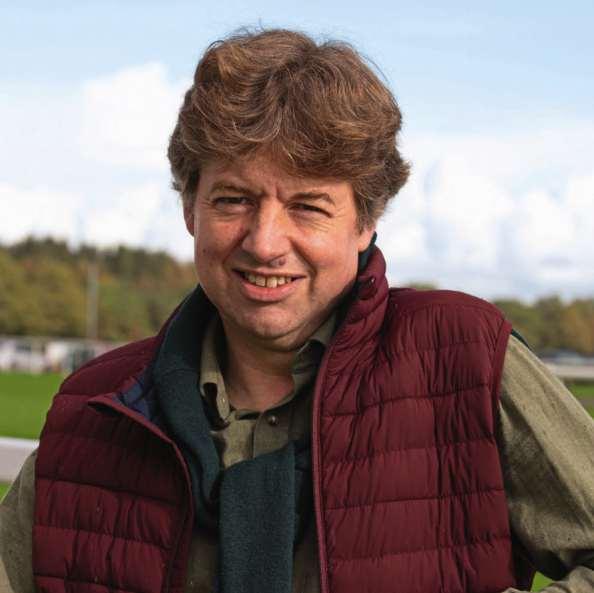
“An excellent cross-section of work, with two heavyweight exclusives and an original expose”
CHRIS COOK
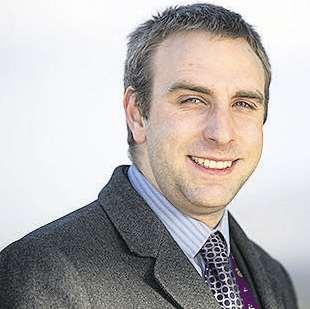
“Three original and hard-hitting pieces, which form a very strong portfolio”
PETER SCARGILL
THE NOMINATIONS
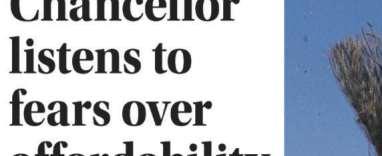
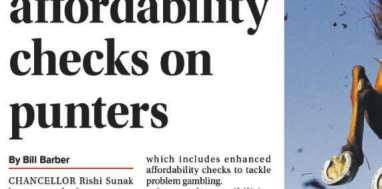
BILL BARBER
Itdoesnotrankhighon thelistofproblemsand inconveniencesthat Covid-19hasinflictedoneveryday existence,butthepandemicdidmake lifedifficultforanewsreportersuch
asmyselftooperate.
As I seldom write directly about the competition on the track itself, the people I speak to are generally involved in governing, organising and financing racing, representing the interests of participants or taking bets on the sport.
My best stories often come from conversations after bumping into people on the racecourse and at conferences - yes, lunches are sometimes involved as well - or from poking my head around the door of a hospitality box and hoping I get invited in.
That all stopped with lockdown. The absence of crowds on racecourses and limits on the number of press people allowed to attend meant there was little point in me going racing.
Instead I would have to use my wits and intelligence to dig up a scoop, a terrifying prospect.
In January it emerged that there was a real possibility that the Gambling Commission could bring in affordability checks which British racing’s leaders feared could wipe tens of millions of pounds from racing’s revenues.
The industry organised an effort for its members to contact their MPs to warn them of their concerns, and with chancellor of the exchequer Rishi Sunak being the local MP for Catterick I thought it was worth calling John Sanderson to see if they had made contact.
John was happy to say they had and what the response had been, which made the perfect lead for a story which kept the momentum going on an important issue.




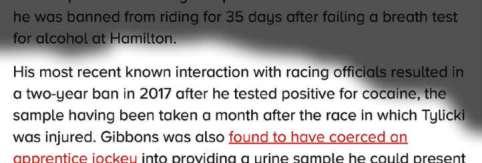




CHRIS COOK
It’s21yearssincemybrief stintasasolicitorbutIstill feeldrawntothosestories whereracingintersectswith thelaw.Listeninginonahearingcan befantasticallydullforhoursbutit’s sooftenworthitforthefiveminutes ofcompellingevidenceyoumightnot hearattheraces.
Two of my stories this year had a legal angle. First, there is the tragedy of Freddy Tylicki’s paralysing injury at Kempton in 2016 and the question of how it was caused. I reported in April he was pursuing his fellow jockey Graham Gibbons through the courts in a case that may come to a final hearing around the time of the HWPA awards day.





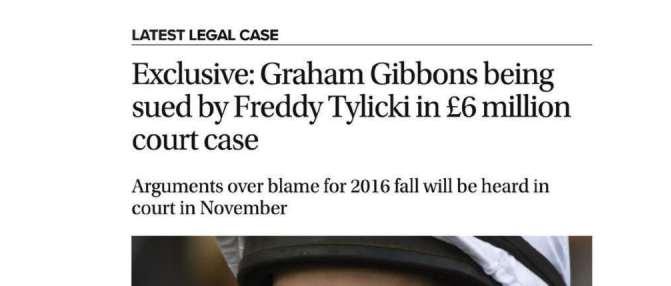

In June, I broke the news that James Longley was suing Paddy Power for £286,000. He had phoned up to ask for £1,300 each-way on Redemptive at 16-1, but somehow their staff processed it as a £13,000 each-way bet.
I wonder if a sequence of events like that has ever happened in a situation where the horse got beat. With the full benefit of hindsight, it was surely inevitable that Redemptive would win, leading to lengthy argument about how much Paddy Power should pay. The firm insisted it was only liable for £28,600 and I was surprised that quite a few punters agreed. As I type, a verdict is still awaited.
Finally, I also wrote about a campaign by jockeys for better changing facilities at the races, some tracks having allowed themselves to fall some way behind what the modern professional athlete is entitled to expect. That story appeared first in the Front Runner, a morning newsletter sent out by the Racing Post five days a week. I hope you’re all signed up to receive it!



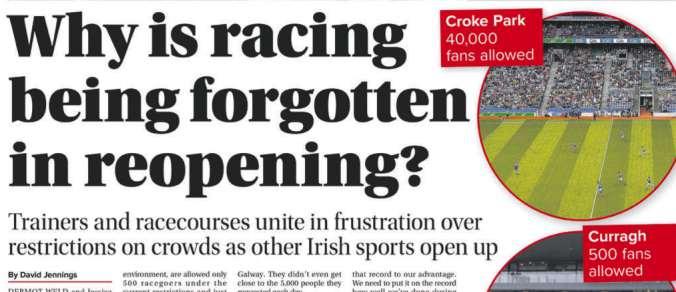
DAVID
JENNINGS
Itwas,asyoucanprobably understand,notwhereIhad expectedtobeonthefirstday ofMarch,andcertainlynot whatIhadexpectedtobereportingon.
A photograph of Gordon Elliott sitting astride a dead horse had gone viral over the weekend and I was the sole reporter granted access to Cullentra House to interview the trainer about what he described as an “indefensible moment of madness”.
It was the first time I have interviewed somebody during a car crash, before the airbags had been released. The pain was real, the scars still bleeding. Tears rolled down his cheeks as he tried to describe the discomfort he was
experiencing. And, he knew he had nobody to blame but himself.
I appeared on Radio 4’s Today programme to discuss the moment of madness and my words prompted Zoe Williams to write a column in the Guardian which was headlined ‘Gordon Elliott has shown that horse racing isn’t a love affair between man and animal’.
My second entry was the front page story in the Racing Post on August 5 headlined ‘Why is racing being forgotten in reopening?’ I spoke to Dermot Weld and Jessica Harrington as well as racecourse managers as they united in frustration over restrictions on crowds as other Irish sporting venues like Croke Park opened up to the public.
My final entry was a race report on the 2021 Irish Champion Hurdle, a race won by the brilliant Honeysuckle. It was the day she shot to the summit of the Champion Hurdle market and confirmed herself to be something very special indeed.
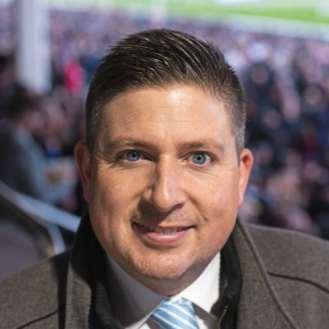



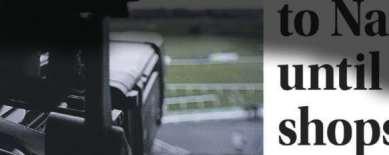
PETER
SCARGILL
Ihaveanendlessfascination withmoney.Notsomuchthe eternalstruggletogetahold ofitoneself,butmorehow otherpeopledosoandthenwhatthey choosetodowithit.
This was one of the key aspects that drove my investigation into Phoenix Thoroughbreds and continues to motivate efforts to shine a light on some of the darker corners of international horseracing.
Money is rarely far from the top of the agenda in racing and, following the coronavirus pandemic, efforts to refinance and stabilise the sport in Britain were laid out by the BHA in its Covid recovery report.
One of the key pillars to this was the ROA-led Industry Ownership Strategy, funded with £1.2 million of levy cash to create a supposed blueprint for how to boost ownership levels and retention in the sport into the future. So when an insipid document arrived last autumn, further investigation was needed.
Alongside calls to key contacts within the ownership structure of British racing, a treasure trove of documents arrived via a Freedom of Information Act request to the Levy Board. It showcased a confused, directionless process that led to a poor return to the sport for the money invested.
Scrutiny of racing’s leaders is in the public interest of the industry and vital for the sport, particularly when considerable sums of money are being spent. The combination of speaking to sources, acquiring and assessing documents and gaining reaction made this story an important one.


